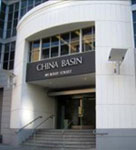UCSF and Abbott launch viral discovery center at Mission Bay

The University of California, San Francisco, has partnered with Abbott, a global health care company, to launch a first-of-its kind, non-profit viral diagnostics center near the UCSF Mission Bay campus to help identify unknown viruses from around the world.
The UCSF Viral Diagnostics and Discovery Center aims to expedite virus discovery in acute and chronic human illnesses, including outbreaks and rare and unusual diseases.
Among the center’s initial projects is genetic sequencing of strains of the H1N1 influenza virus that emerged in Mexico this spring. The lab is collaborating with international researchers to compare strains found in patients in Mexico, the United States and Canada, in an effort to identify how stable the virus is and how it is changing as it spreads.
The center also is actively engaged in efforts to characterize rare and unusual strains of HIV from Cameroon, Africa, according to Charles Chiu, MD, PhD, an assistant professor at UCSF and director of the new center.
“We have seen tremendous demand from around the world for help in identifying the cause of infectious diseases, in both humans and animals,” said Chiu, who also is affiliated with the California Institute for Quantitative Biosciences, or QB3. “This center starts to address this need.”
The center’s technology is based on the ViroChip, a high-throughput screening technology that uses a DNA microarray to test viral samples. The ViroChip was developed by UCSF professors Joe DeRisi, PhD, and Donald Ganem, MD, and was first used in the 2003 identification of the virus causing Severe Acute Respiratory Syndrome, or SARS.
Since then, the DeRisi Laboratory has fielded numerous requests to help identify mysterious illnesses that have stumped public health agencies, physicians and veterinarians alike, Chiu said.
While two similar viral diagnostics centers exist in New York and Singapore – the latter also set up in collaboration with DeRisi – this center is unique in offering both viral discovery as well as serving as a diagnostic resource for clinical researchers and physicians.
The center also will help Abbott in its efforts to develop innovative diagnostic technologies and tests to detect new infectious agents as they arise, especially for application in screening blood supplies.
“In the past two decades, many human diseases, including ulcers and cervical cancer, have been discovered to be caused by bacteria or viruses,” said John Hackett, PhD, manager of Abbott’s Virus Discovery Program, who led Abbott’s efforts to create the new center. “This center could prove to be a powerful partnership for detecting more infectious agents, leading to the development of new diagnostics and therapeutics.”
He said the partnership will aid in discovering new human viruses that affect both acute and chronic human diseases and also will help develop a comprehensive picture of the diversity of viral pathogens present during infection.
“This partnership gives both Abbott and UCSF a unique opportunity to translate laboratory discoveries into medical practice,” said Gerald Schochetman, PhD, senior director of infectious disease diagnostics research and development at Abbott.
Over the past two years, scientists at UCSF and Abbott have worked together to create a new model for this type of center. Last year, Abbott agreed to provide funding to build and equip the center, which is located in China Basin, near Mission Bay.
“This center is a testament to the enormous value of seed funding into bioscience research and of partnerships between industry and academic scientists,” said Douglas Crawford, PhD, associate director of QB3 in charge of industry partnerships. “Herb and Marion Sandler’s seed funding supported development of the ViroChip and Abbott’s forward-thinking investment has created another venue for the technology to advance global understanding of viruses.”
The ViroChip project was developed with $100,000 in seed funding from the Sandler Family Supporting Foundation. Both DeRisi and Ganem are Howard Hughes Medical Investigators at UCSF, which supported the ViroChip’s further development. Crawford said Abbott provided both funding and significant scientific expertise in validating the technology for clinical use.
“Ultimately, this is the real value of industry partnerships – we complement the skills in each institution,” Crawford said. “To achieve this, we need great people, mutual respect, an atmosphere of trust and great facilities. This center has all of these.”
Abbott has a rich tradition of innovation in the development of tests and therapeutics for infectious diseases. In 1985, it was the first company to develop and commercialize a test to detect HIV and, in 1996, was the first company to develop a protease inhibitor for treatment of HIV/AIDS. The company has been and remains a global leader in diagnostics, including blood-screening technologies used to ensure the safety of blood supplies worldwide.
The viral diagnostics center and DeRisi Laboratory are part of QB3, a cooperative effort among private industry and more than 200 scientists at UCSF, UC Berkeley and UC Santa Cruz. Headquartered on the UCSF Mission Bay campus, QB3 harnesses the quantitative sciences to integrate and enhance scientific understanding of biological systems at all levels, enabling scientists to tackle problems that have been previously unapproachable.
About Abbott
Abbott (NYSE: ABT) is a global, broad-based health care company devoted to the discovery, development, manufacture and marketing of pharmaceuticals and medical products, including nutritionals, devices and diagnostics. The company employs approximately 72,000 people and markets its products in more than 130 countries.
About UCSF
UCSF is a leading university dedicated to promoting health worldwide through advanced biomedical research, graduate-level education in the life sciences and health professions, and excellence in patient care. For further information, please visit www.ucsf.edu.
For further information on the viral center, please visit http://vddc.ucsf.edu